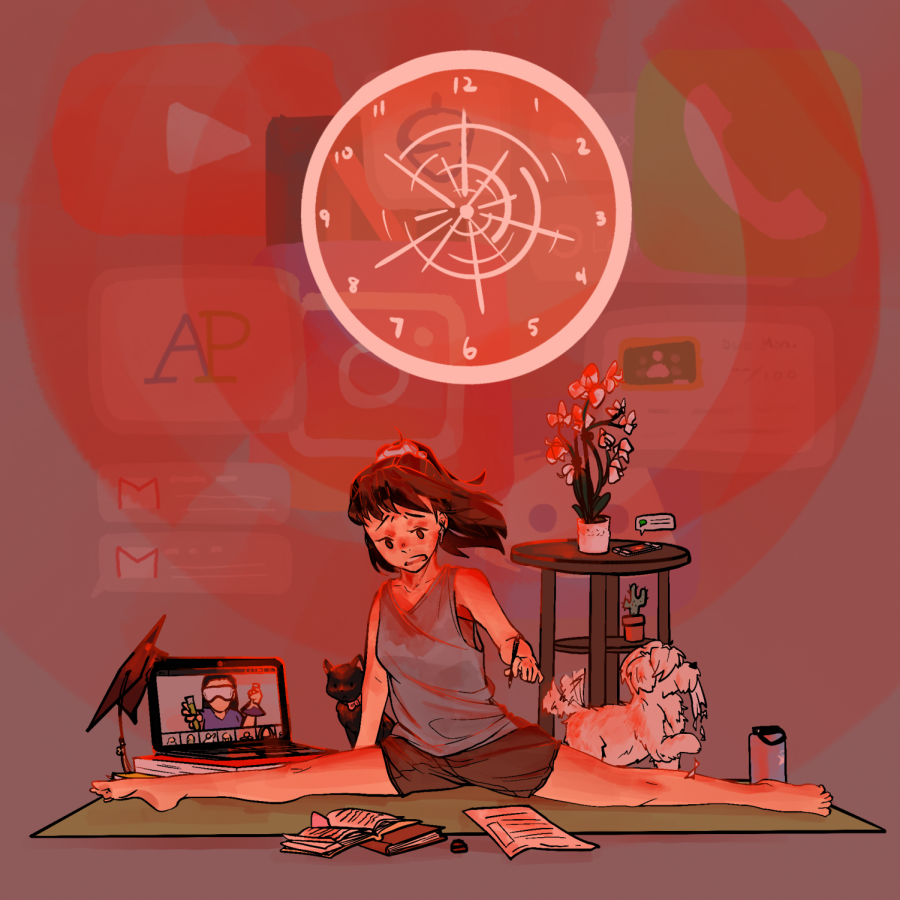The Dark Side of Productivity
May 14, 2020
With the recent onset of quarantine, social media has become flooded with posts directed towards motivating people into productivity. Videos of workouts for a “summer body” or promising “Abs in 2 Weeks” are all over the Internet, and fitness gurus such as Chloe Ting and Alexis Ren have become household names. Furthermore, videos and posts are targeted towards being productive, whether it’s developing a new skill or hobby, studying for schoolwork, or generally making use of the time in a “correct way”. There seems to be a general consensus throughout the online platforms that quarantine is the ideal time to work on oneself and come out of the situation new and improved.
However, despite the positive influence some of these motivational posts can have, there are also plenty of negative effects as well, making this unusual time even more challenging to cope with. In regards to mental and physical health, motivational posts have the ability to drastically decrease one’s self-confidence. For many, including my friends, exercise and fitness aren’t always possible, due to various reasons such as the restraints of living in a crowded area surrounded by people inside and outside of the house, having the tendency to eat more in isolation, or being bombarded by other priorities during the quarantine. Consequently, feelings of self-esteem may decrease, and body image issues may begin to arise. It’s an uncomfortable feeling to be overwhelmed by all these posts, but the negative mentality is even more problematic, as it can last far into the future. In fact, some influencers have spoken about the dangers of possibly triggering past eating disorders or compounding any existing mental health issues.
Body image and self-confidence aren’t the only dilemmas. All over the nation, people are being encouraged to be more productive than ever. With the expectation of more free time, social media teaches the idea that productivity is good, and anything else would be a waste. For students, this could mean studying all day, even more than they normally would on a regular school day. Not only is this physically draining as our bodies adjust to this new workload, but it is also mentally exhausting to be pressured under this expectation of neverending hard work. While the motivation for productivity may lead to greater output, it also comes at a cost by making people feel worse about their possible lack of energy or sense of uncertainty.
I’ve talked to so many of my friends about all the changes this quarantine has brought, especially with the drastic increase of motivational posts. Honestly, it is tiring to be stuck in the mindset of the hustle culture all the time. It’s completely fine if people genuinely want to work out or stick to a schedule during this quarantine to gain a sense of normality and self-happiness, but the problem lies with the expectation and unhealthy pressures. We really shouldn’t be holding ourselves to standards that we normally wouldn’t even have, because, at the end of the day, everyone deserves to do whatever they need to feel comfortable in this scary and bizarre pandemic. Whether it is sticking to an intense exercise regimen, or eating more than usual while watching television all day, no one is allowed to judge, including ourselves, because we are all trying our best to get through this time. The key is balance, so eat more or less, and do more or less; just be happy with whatever you choose.
Graphic by Roselind Zeng

